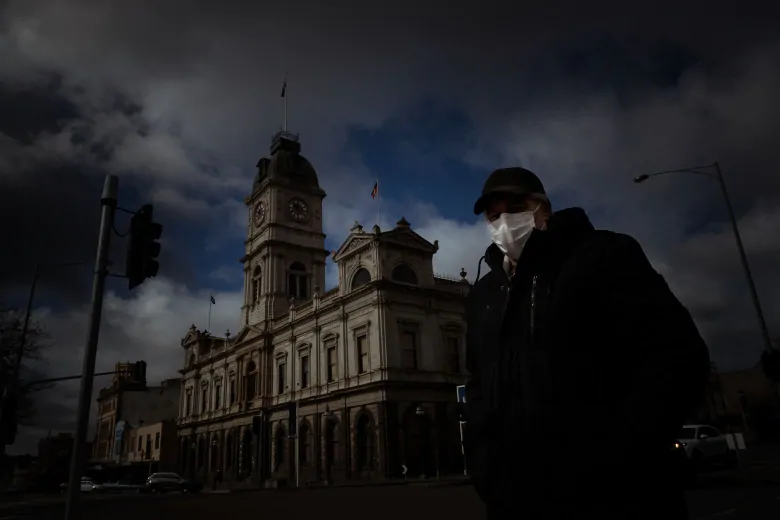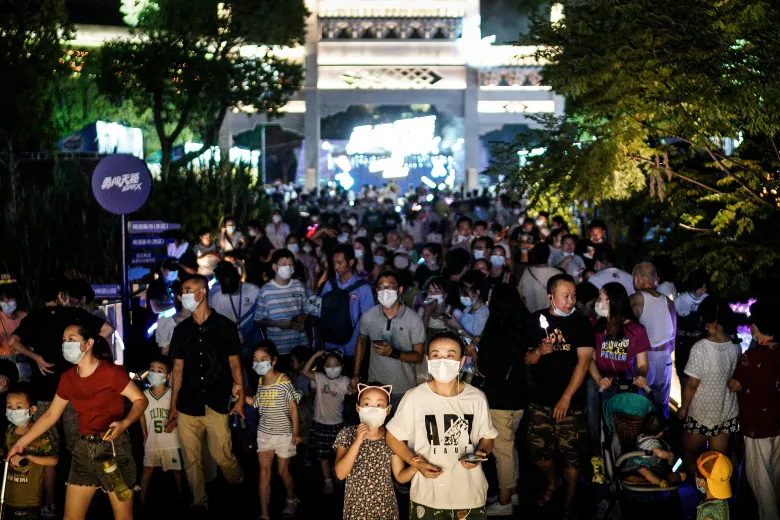The latest:
South Korea is banning large gatherings, closing beaches, shutting nightspots and churches, and removing fans from professional sports in strict new measures announced Saturday as it battles the spread of the novel coronavirus.
Health Minister Park Neung-hoo announced the steps shortly after the Korea Centers for Disease Control and Prevention reported 332 new cases — the ninth straight day of triple-digit increases. The national caseload is now at 17,002, including 309 deaths.
While most of the new cases came from the densely populated Seoul metropolitan area, which has been at the centre of the viral surge in recent weeks, infections were also reported in practically every major city and town, raising concerns that transmissions are slipping out of control.
The government had already imposed elevated physical distancing measures in Seoul this week after resisting them for months out of economic concerns.
“We are now in a very dangerous situation that could trigger a massive nationwide spread of COVID-19,” Park said.
Churches had been a major source of new cases in the Seoul area before authorities shut them this week. Nightclubs, karaoke bars, buffet restaurants and computer gaming cafés in the greater capital region have also closed and spectators are banned again from baseball and soccer games, just weeks after teams had been allowed to sell portions of their seats.
The same measures will apply nationwide from Sunday, although Park said local governments will be permitted to exercise some level of flexibility, such as advising business shutdowns rather than enforcing them, if infections are low.
KCDC director Jeong Eun-kyeong has endorsed even stronger restrictions. If there’s no sign that the virus spread is slowing after the weekend, she said the country should consider elevating physical distancing measures to “Level 3,” which includes prohibiting gatherings of more than 10 people, shutting schools, halting professional sports and advising private companies to have employees work from home.
WATCH | Flu cases could tumble due to coronavirus measures, says infection control specialist:
What’s happening with coronavirus in Canada
As of 9 a.m. ET on Saturday, Canada had 124,372 confirmed and presumptive coronavirus cases. Provinces and territories listed 110,648 of those as recovered or resolved. A CBC News tally of deaths based on provincial reports, regional health information and CBC’s reporting stood at 9,100.
Three of the four Atlantic provinces have no plans to expand beyond the Atlantic bubble.
N.B. Progressive Conservative Leader Blaine Higgs, who is in the midst of a provincial election, said he has no plans to change the bubble’s parameters.
WATCH | Private education pods limit COVID-19 exposure but deepen wealth divide:
“I think certainly starting up with schools, universities, international students coming, it’s important to maintain our restrictions until we see that that’s looked after,” he said. “I don’t see any changes.”
Newfoundland and Labrador and Prince Edward Island appear to be on the same page, but there’s a prospect of bubble defection on the Nova Scotia side.
Nova Scotia Premier Stephen McNeil says if other Atlantic provinces’ health authorities don’t give him the green light, he may still open up his borders to the rest of Canada.
“If public health in other provinces aren’t ready and ours is, then we’ll move forward on it,” he said at a news conference Thursday. “Obviously, it would be ideal if we can all go together, but if that’s not possible we’ll look at our own epidemiology and potentially go at it alone.”
Here’s what’s happening around the world
According to Johns Hopkins University, the global total of confirmed coronavirus cases stands at more than 22.9 million. More than 799,000 people have died, while 14.6 million have recovered.
India has recorded another 24-hour jump in coronavirus infections as the disease spreads across the country’s southern states after plateauing in the capital and the financial centre of Mumbai.
The Health Ministry reported 69,878 new cases on Saturday, bringing the total to 2,975,701. Globally, India has been reporting the biggest daily rise in cases for 18 consecutive days.
Some 2.2 million people have recovered from the disease in India since the first case was diagnosed in late January.
India has the third-highest caseload after the United States and Brazil, and its 55,794 deaths give it the fourth-highest death toll in the world.

New cases of COVID-19 in Australia‘s Victoria state continued to decline Saturday with 182 new infections, along with 13 deaths.
It was the second day in a row in which the number of new infections has fallen below 200. Only 24 of the latest cases are without a known source, a contrast to the start of August when hundreds could not be traced.
Australia’s second-largest city, Melbourne, and parts of rural Victoria were placed in full lockdown in early August. It’s due to continue until Sept. 13.
WATCH | Saliva tests could change course of pandemic:
“Whilst tomorrow’s numbers will be for tomorrow, we are all pleased to see a ‘one’ in front of these additional case numbers, and to a certain extent, it is perhaps at that level a little quicker than I thought it might be,” Victoria Premier Daniel Andrews said.
Meanwhile, an outbreak linked to a youth detention centre in Queensland state has caused the state’s premier to reintroduce restrictions on public gatherings. The cluster connected to the Brisbane Youth Detention Center now stands at seven, including six confirmed on Saturday.
The 127 inmates, some as young as 13, have been locked in their rooms since a 77-year-old female supervisor tested positive on Wednesday. The worker, who is now in hospital, worked five shifts at the centre while infectious.
Queensland Premier Annastacia Palaszczuk told a news conference Saturday the cases are of concern because “people have been out and about in the community.”

China on Saturday reported another 22 new cases brought by travellers from abroad, with no additional local infections. The National Health Commission said 454 people remain in treatment and 3,667 are in isolation.
While local spread of the virus appears to have been contained in mainland China, the semi-autonomous southern region of Hong Kong continues to struggle with its worst outbreak since the pandemic began.
The territory’s leader Carrie Lam said Friday Hong Kong will offer free coronavirus tests to its residents over a period of two weeks starting Sept. 1., in hopes of restarting the services-dependent local economy. The city’s economy contracted nine per cent in the second quarter of this year.
A new surge in infections has more than tripled the number of cases in the city to 4,632, with 75 deaths.

The Czech Republic has recorded its biggest single-day jump in coronavirus cases.
The Health Ministry said Saturday that there were 506 new cases in the latest 24-hour period. The previous high was 377 cases registered on March 27.
Saturday’s announcement comes a day after neighbouring Slovakia also reported a record daily increase of infected people.
The Czech Republic has had 21,551 cases overall, including 411 deaths.





More Stories
Allegations of corruption Qatar warns of ‘negative impact’ of European measures
USA: Famous “Hollywood cat” euthanized in Los Angeles
The campaigner who called for the shooting of Ukrainian children has not been charged